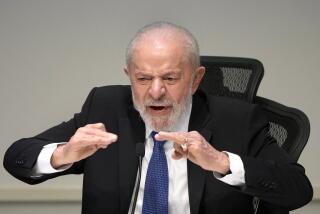Duarte Peace Bid Spurned by Left, Right : Offer to Postpone Salvadoran Election Is Called Unacceptable
- Share via
SAN SALVADOR — Leaders of leftist and rightist political parties Monday rejected as unacceptable a compromise peace proposal by President Jose Napoleon Duarte that would postpone a presidential election until April 30.
Ricardo Alvarenga Valdivieso of the ultra-rightist Nationalist Republican Alliance (Arena), who is president of the National Assembly, pointed out that the election has already been set for March 19 and said this date “has to be observed.” He said that any deviation would be unconstitutional.
Guillermo Ungo, the presidential candidate of the Democratic Convergence, a coalition of socialist and leftist parties, said that while Duarte deserves to be commended for trying to find a compromise settlement in the nine-year-old civil war, delaying the election until April 30 would not provide time enough for a truly democratic vote.
Ruben Zamora, another Democratic Convergence leader, said the Duarte proposal “is unacceptable and does not contribute to peace.”
But he said the party will take part in the election even if it is held March 19.
Duarte, who had earlier opposed any delay in the election as unconstitutional, suggested the postponement Sunday night as his answer to a plan offered last month by the rebel Farabundo Marti National Liberation Front (FMLN).
The FMLN offered to take part in the presidential election and accept the results if the election were postponed until Sept. 15. This proposal was later modified, calling for a mid-July election, and the modification was accompanied by a cease-fire offer. The FMLN said its 7,000 guerrillas would put down their weapons if the army would reduce its strength from 56,000 men to 12,000 and see to the punishment of military personnel guilty of human rights abuses.
Ungo, the Democratic Convergence candidate, said Monday that his party and the FMLN could not accept Duarte’s call for a meeting today in Guatemala between government officials and guerrilla leaders.
Other Democratic Convergence leaders said that such a meeting would require more time for planning. Also, they said they would not travel to a country they regard as under military control.
Arena’s rejection of Duarte’s proposal was regarded as the more important. Arena is favored to win the election as it is now scheduled, and any postponement would have to be approved by the National Assembly. Since Arena controls the National Assembly, there appears to be little likelihood of this.
Proposal Challenged
Armando Calderon Sol, the mayor of San Salvador and an influential Arena leader, challenged a provision of the Duarte proposal for a national plebiscite if there is no agreement on his proposed delay.
“Duarte says a plebiscite expresses the will of the people,” Calderon Sol told reporters, “but that is exactly what this election is--an expression of the people’s will.”
According to some legal experts, any plebiscite dealing with elections must be approved by the National Assembly. And even if that obstacle could be overcome, Duarte did not say when a plebiscite might be scheduled or exactly what the people would be asked to decide.
In Washington, meanwhile, State Department spokesman Charles Redman said the Duarte plan is “potentially the most significant opportunity ever for peace” in El Salvador.
Redman said that if Duarte’s plan fails, it will be the responsibility of the FMLN, but Arena leaders and independent political observers said that Duarte’s aim is to force the right-wing party to take the blame.
“He passed the ball to us,” an Arena official said. “We’re holding the fire now.”
Despite the negative reactions to Duarte’s plan, it is not dead. Ungo, in turning down the idea of a meeting today in Guatemala, did not rule out a meeting on another day in another place. Nor did Arena officials, who first proposed a meeting with the guerrillas.
More to Read
Sign up for Essential California
The most important California stories and recommendations in your inbox every morning.
You may occasionally receive promotional content from the Los Angeles Times.













